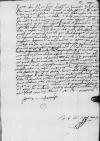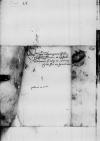Quid de obitu reverendissimi domini Jan Chojeński (*1486 – †1538), 1523 royal secretary, 1526-1537 Grand Secretary; 1531-1535 Bishop of Przemyśl, 1535-1537 Bishop of Płock, 1537-1538 Bishop of Cracow, 1537-1538 Grand Chancellor of the Crown (WYCZAŃSKI 1990, p. 248-249; PSB 3, p. 396-399)⌊episcopi CracoviensisJan Chojeński (*1486 – †1538), 1523 royal secretary, 1526-1537 Grand Secretary; 1531-1535 Bishop of Przemyśl, 1535-1537 Bishop of Płock, 1537-1538 Bishop of Cracow, 1537-1538 Grand Chancellor of the Crown (WYCZAŃSKI 1990, p. 248-249; PSB 3, p. 396-399)⌋ totus maerore confectus vel scribo, vel facio, nescio, ita me, cum tales nobis viri et ecclesiae, et Royal Prussia (Prussia Regalis), region, part of Prussia annexed to the Kingdom of Poland in 1466 under the provisions of the Second Peace of Thorn⌊reipublicae nostraeRoyal Prussia (Prussia Regalis), region, part of Prussia annexed to the Kingdom of Poland in 1466 under the provisions of the Second Peace of Thorn⌋ necessarii auferuntur, taedet me vivere, qui eorum comparatione nullius sum usui.[1] Ex eo nihil aliud quam apertam et graviorem in nos iusti Dei cf. Vulg. Est 1.18 Atque hoc exemplo omnes principum coniuges Persarum atque Medorum parvipendent imperia maritorum: unde regis iusta est indignatio. ⌊iustam indignationemcf. Vulg. Est 1.18 Atque hoc exemplo omnes principum coniuges Persarum atque Medorum parvipendent imperia maritorum: unde regis iusta est indignatio. ⌋ in dies suboriri video, neque immerito, a capite enim omnia haec in nos mala derivantur. Quod quale sit et cuiusmodi sint illi, qui illud dirigunt, non potest non liquere sanis omnibus. Quod et nos cum nostris in Rome (Roma), city in central Italy, on the Tiber river, seat of the Holy See⌊UrbeRome (Roma), city in central Italy, on the Tiber river, seat of the Holy See⌋ negotiis perspicue experimur, maxime autem Dominatio Vestra Reverendissima, pro qua non ambigo omnia sic ex aula nostra scripta esse, quemadmodum fuerat praescriptum, suppressa autem a Antonio Pucci (*1484 – †1544), 1517-1521 papal nuncio in Switzerland; 1518-1541 Bishop of Pistoia; 1529-1541 Bishop of Vannes; 1529-1544 Penitentiary Major; 1531-1541 Cardinal of SS. IV Coronati; 1541-1542 Cardinal of Santa Maria in Trastevere; 1542-1543 Bishop of Albano; 1543-1544 Bishop of Sabina; 1532-1544 Cardinal Protector of the Kingdom of Poland and Portugal (WOJTYSKA 1977, p. 243; CE, p. 122-123)⌊cardinaliAntonio Pucci (*1484 – †1544), 1517-1521 papal nuncio in Switzerland; 1518-1541 Bishop of Pistoia; 1529-1541 Bishop of Vannes; 1529-1544 Penitentiary Major; 1531-1541 Cardinal of SS. IV Coronati; 1541-1542 Cardinal of Santa Maria in Trastevere; 1542-1543 Bishop of Albano; 1543-1544 Bishop of Sabina; 1532-1544 Cardinal Protector of the Kingdom of Poland and Portugal (WOJTYSKA 1977, p. 243; CE, p. 122-123)⌋, cf. Dietrich von RHEDEN to Ioannes DANTISCUS Rome, 1538-01-28, CIDTC IDL 3676⌊ut noster Dietrich von Rheden (Teodoryk Reden) (*1492 – †1556), doctor of both canon and civil law. Rheden spent most of his life in Rome where he was dealing with, among other things, the affairs of the Ermland Chapter; 1532-1551 Canon of Ermland (Warmia); Canon of Mainz and Lübeck; in 1551 he was appointed Bishop of Lübeck, but he did not accept the dignity (KOPICZKO 2, p. 263; SBKW, p. 200)⌊procuratorDietrich von Rheden (Teodoryk Reden) (*1492 – †1556), doctor of both canon and civil law. Rheden spent most of his life in Rome where he was dealing with, among other things, the affairs of the Ermland Chapter; 1532-1551 Canon of Ermland (Warmia); Canon of Mainz and Lübeck; in 1551 he was appointed Bishop of Lübeck, but he did not accept the dignity (KOPICZKO 2, p. 263; SBKW, p. 200)⌋ suspicaturcf. Dietrich von RHEDEN to Ioannes DANTISCUS Rome, 1538-01-28, CIDTC IDL 3676⌋, certo mihi persuadeo. Quod, si viveret, cuius me mors summo dolore afficit, clare testaretur. Qui quidem me dolor, a quo ad sacrum, Deo bene favente, peragendum non invitus written over m⌈mss written over m⌉ cras inducor written over it⌈itoror written over it⌉, ne plura scribam, impedit.
Ceterum, cum iam de nostris confirmationibus simus securi, licet diplomata non adsint, in<n>itar Dominationis Vestrae Reverendissimae consilio acturus statuto tempore apud ecclesiam[2] chrismatis consec written over t⌈tcc written over t⌉rationem.
Pauloque post de omnibus latius – plura scribere rorantes oculi, nedum dolor et gemitus, vetant. Deus Omnipotens animae illi, meo sane iudicio sanctae,
cf. Vulg. Io 14.23 Si quis diligit me, sermonem meum servabit, et Pater meus diliget eum, et ad eum veniemus, et mansionem apud eum faciemus ⌊aeternam apud se det mansionemcf. Vulg. Io 14.23 Si quis diligit me, sermonem meum servabit, et Pater meus diliget eum, et ad eum veniemus, et mansionem apud eum faciemus ⌋, am(en), et Dominationi Vestrae Reverendissimae, quae multam mihi precatur felicitatem, parem et auctiorem, aetatemque diutissime incolumem.


 BCz, 245, p. 24
BCz, 245, p. 24